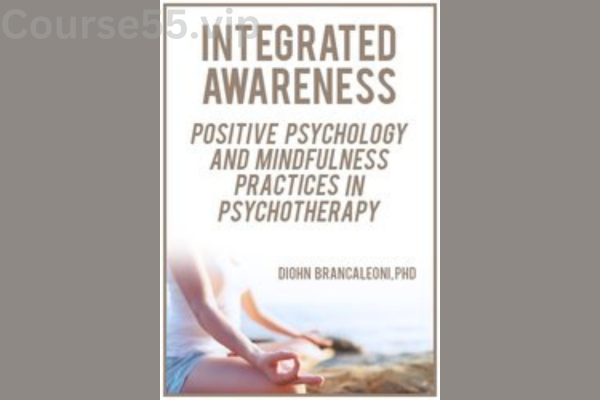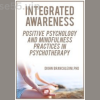-
×
 Understanding the Needs of the Dying: Bringing Hope, Comfort and Love to Life's Final Chapter By David Kessler - PESI
1 × $23.10
Understanding the Needs of the Dying: Bringing Hope, Comfort and Love to Life's Final Chapter By David Kessler - PESI
1 × $23.10 -
×
 Rewire the Anxious Brain: Neuroscience-Informed Treatment of Anxiety, Panic and Worry By Marwa Azab - PESI
1 × $23.10
Rewire the Anxious Brain: Neuroscience-Informed Treatment of Anxiety, Panic and Worry By Marwa Azab - PESI
1 × $23.10 -
×
 Utah Legal and Ethical Issues for Mental Health Clinicians By Susan Lewis - PESI
1 × $23.10
Utah Legal and Ethical Issues for Mental Health Clinicians By Susan Lewis - PESI
1 × $23.10 -
×
 What to Do in the First 90 Days of Your New Job
1 × $23.10
What to Do in the First 90 Days of Your New Job
1 × $23.10
Integrated Awareness: Positive Psychology and Mindfulness Practices in Psychotherapy By Diohn Brancaleoni – PESI
$200.00 Original price was: $200.00.$23.10Current price is: $23.10.
SKU: C55vip.11139ZA341M0r
Category: Download
Tags: Diohn Brancaleoni - PESI, Integrated Awareness, Positive Psychology, Positive Psychology and Mindfulness Practices in Psychotherapy
Integrated awareness: Positive psychology and mindfulness practices in psychotherapy by Diohn Brancaleoni – Digital Download!

Integrated Awareness: Positive Psychology and Mindfulness Practices in Psychotherapy By Diohn Brancaleoni – PESI
Overview

Integrated Awareness: Positive Psychology and Mindfulness Practices in Psychotherapy by Diohn Brancaleoni
In a world increasingly attuned to the complexities of mental health, the course Integrated Awareness: Positive Psychology and Mindfulness Practices in Psychotherapy by Diohn Brancaleoni serves as an invaluable resource, providing therapeutic tools designed to enhance effectiveness. Over more than five hours, this course deeply explores the connection between positive psychology, mindfulness practices, and their integration into psychotherapy. By equipping mental health professionals with detailed insights and practical techniques, it addresses significant challenges clients face, including impulsivity, emotional regulation, self-esteem, and communication skills. Through this comprehensive course, Dr. Brancaleoni draws on over 20 years of professional experience to create a therapeutic environment that is both inclusive and effective.
A key focus of Brancaleoni’s course is the application of a strengths-based approach, a method that empowers clients by highlighting their inherent strengths as the foundation for growth. Unlike traditional therapies that often focus on identifying weaknesses, a strengths-based perspective encourages clients to recognize their potential and build on it. This shift in focus not only motivates clients but also contributes to their long-term mental well-being. Through various exercises, Dr. Brancaleoni works to enhance clients’ awareness and overall happiness, shifting their self-perception from one of limitation to one of possibility.
Additionally, the course underscores the importance of physical regulation and emotional balance within the therapeutic process. Dr. Brancaleoni encourages participants to integrate practices like mindful breathing, body posture, and movement, which are essential for achieving emotional stability. This holistic approach aligns with the principles of both positive psychology and mindfulness, where the body and mind are viewed as interconnected. By regulating their physical states, clients enhance their emotional resilience and foster a more balanced psyche. The course also highlights the importance of social connections in leading a meaningful life, stressing the role therapists play in helping clients understand their relationships with others.
Core Elements of the Program
This course covers several critical areas that are essential for any mental health professional wishing to deepen their understanding of modern therapeutic practices. Below is an overview of the essential topics:
-
Foundations of Positive Psychology: An exploration of how core concepts from positive psychology can be woven into therapeutic techniques.
-
Mindfulness Methods: Development of mindfulness strategies designed to improve client outcomes by enhancing self-awareness and presence.
-
The Role of Social Relationships: An exploration of the significance of social connections in overall mental well-being and health.
-
Empowering Clients: Practical approaches to empowering clients by focusing on their strengths to facilitate personal growth and change.
A significant aspect of this course is the integration of evidence-based practices that can be easily incorporated into traditional psychotherapy and counseling environments. This is essential as it grounds theoretical concepts in practical application, enabling therapists to adapt their approaches to meet the specific needs of each client. Dr. Brancaleoni emphasizes the use of empirical evidence as a bridge between psychological theory and its real-world application, ensuring that participants are not only informed of what works but also how to implement these methods effectively in their practice.
Improving Therapy Effectiveness
The incorporation of positive psychology and mindfulness into psychotherapy reflects a broader trend in mental health toward holistic, client-centered approaches. The course emphasizes the importance of assessing both mental and physical health, considering how clients’ social interactions and life circumstances contribute to their overall well-being. This multifaceted perspective acknowledges that mental health is influenced not just by internal factors but also by the quality of social connections and support systems available to the individual.
Research has shown that strong social ties contribute significantly to mental health, with individuals who have healthy relationships being more likely to experience better mental well-being. For example, a study published in the American Journal of Psychiatry demonstrated that social support can significantly reduce symptoms of anxiety and depression, reinforcing the course’s emphasis on social integration as a vital aspect of therapy.
Furthermore, Dr. Brancaleoni shares actionable techniques for therapists to help clients foster positive changes, such as incorporating mindfulness exercises into therapy sessions. These exercises help clients engage with their emotions and thoughts non-judgmentally, leading to healthier coping mechanisms. This practice supports emotional regulation and improves communication, both essential for building resilient clients.
Practical Approaches to Therapy
Therapists who complete this course report notable improvements in their ability to connect with clients, as they are equipped with practical tools that can be immediately applied to sessions, facilitating deeper dialogue and more meaningful outcomes. Some of the techniques covered in the course include:
-
Breathing Techniques for Grounding: Focused exercises that use controlled breathing to help clients become more present and calm during sessions.
-
Mindful Movement Practices: Simple activities incorporated into therapy sessions to enhance clients’ awareness of their physical and emotional states.
-
Strength Visualization Exercises: Techniques that guide clients in visualizing their strengths and past successes to build a positive self-image.
-
Social Reintegration Techniques: Activities designed to help clients reconnect with their social support systems, improving their relationships.
By incorporating these techniques, therapists enrich the therapeutic process and make therapy a collaborative experience, encouraging clients to be actively involved in their healing journey. As clients learn to navigate their thoughts and emotions with these strategies, they often experience profound shifts in their outlook and daily life.
Conclusion
To sum up, the course Integrated Awareness: Positive Psychology and Mindfulness Practices in Psychotherapy by Diohn Brancaleoni is an essential resource for mental health professionals. By integrating key principles from positive psychology and mindfulness, this course empowers therapists to create a more positive, engaged, and effective therapeutic environment. Through evidence-based practices that focus on leveraging clients’ strengths, therapists can facilitate meaningful transformations that extend beyond the therapy room. This holistic approach not only enhances therapeutic practice but also equips a new generation of therapists with the tools to meet the diverse needs of clients in today’s complex mental health landscape.
Frequently Asked Questions:
Business Model Innovation: We operate a group buying strategy, allowing participants to share costs and access popular courses at reduced prices. This model benefits individuals with limited financial resources, despite concerns from content creators about distribution methods.
Legal Considerations: The legality of our operations involves complex issues. Although we don’t have explicit permission from course creators to resell their content, there are no specific resale restrictions stated at the time of purchase. This ambiguity creates an opportunity for us to provide affordable educational resources.
Quality Control: We ensure that all course materials purchased are identical to those offered directly by the creators. However, it’s important to understand that we are not official providers. As such, our offerings do not include:
– Live coaching calls or sessions with the course author.
– Access to exclusive author-controlled groups or portals.
– Membership in private forums.
– Direct email support from the author or their team.
We aim to reduce the cost barrier in education by offering these courses independently, without the premium services available through official channels. We appreciate your understanding of our unique approach.
Be the first to review “Integrated Awareness: Positive Psychology and Mindfulness Practices in Psychotherapy By Diohn Brancaleoni – PESI” Cancel reply
You must be logged in to post a review.














Reviews
There are no reviews yet.